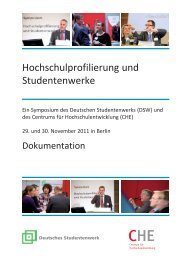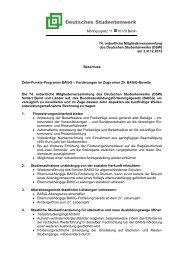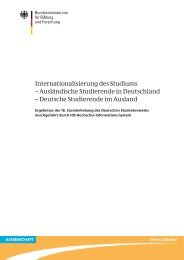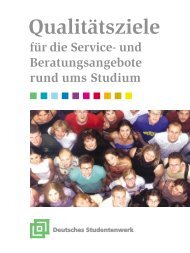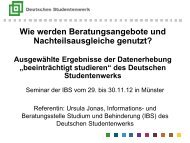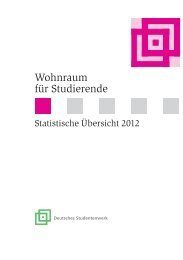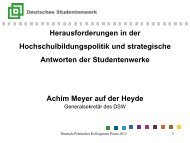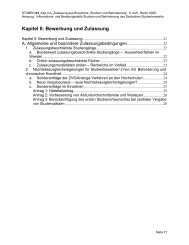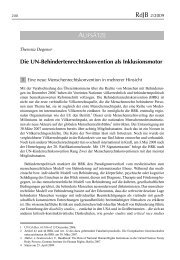the role of student affairs and services in higher education
the role of student affairs and services in higher education
the role of student affairs and services in higher education
Create successful ePaper yourself
Turn your PDF publications into a flip-book with our unique Google optimized e-Paper software.
terms <strong>of</strong> demographics, <strong>in</strong>clud<strong>in</strong>g age, gender, ethnicity <strong>and</strong> social class factors,<br />
but also <strong>in</strong> terms <strong>of</strong> personal attributes <strong>and</strong> characteristics, <strong>in</strong>clud<strong>in</strong>g<br />
psychosocial characteristics, learn<strong>in</strong>g styles, abilities, motivation, <strong>and</strong> academic<br />
<strong>and</strong> personal preparedness for <strong>higher</strong> <strong>education</strong>. Accord<strong>in</strong>gly, <strong>student</strong> <strong>affairs</strong><br />
<strong>and</strong> <strong>services</strong> is one <strong>of</strong> <strong>the</strong> most appropriately positioned entities <strong>in</strong> universities to<br />
collect mean<strong>in</strong>gful <strong>student</strong> data <strong>and</strong> for that data to be evaluated, syn<strong>the</strong>sized<br />
<strong>and</strong> placed <strong>in</strong>to research <strong>and</strong> program development. Good, firm data <strong>in</strong>form<br />
<strong>the</strong>oretical development that <strong>in</strong> turn <strong>in</strong>forms practice <strong>and</strong> fur<strong>the</strong>r research.<br />
Some <strong>of</strong> <strong>the</strong> major research <strong>and</strong> quantitative (as well as qualitative) foci <strong>in</strong>clude:<br />
acculturat<strong>in</strong>g curricula; improv<strong>in</strong>g teach<strong>in</strong>g; address<strong>in</strong>g systemic <strong>in</strong>equities <strong>in</strong><br />
enrolment patterns; address<strong>in</strong>g participation, success <strong>and</strong> graduation outcomes;<br />
exam<strong>in</strong><strong>in</strong>g culture-fair assessment <strong>and</strong> evaluation procedures; ensur<strong>in</strong>g equitable<br />
progression <strong>and</strong> learn<strong>in</strong>g outcomes; address<strong>in</strong>g retention issues; ensur<strong>in</strong>g <strong>the</strong><br />
capacity <strong>of</strong> graduates to successfully negotiate <strong>and</strong> undertake careers <strong>of</strong> first<br />
choice, <strong>and</strong> social or environmental surveys.<br />
For example, European <strong>student</strong> <strong>services</strong> agencies are noted for <strong>the</strong>ir regular<br />
social surveys <strong>of</strong> <strong>student</strong>s. In o<strong>the</strong>r parts <strong>of</strong> <strong>the</strong> world <strong>the</strong>se studies are called<br />
environment or <strong>student</strong> needs studies. It is recommended that a comprehensive<br />
<strong>and</strong> extensive study <strong>of</strong> <strong>the</strong> social <strong>and</strong> economic liv<strong>in</strong>g conditions <strong>of</strong> <strong>student</strong>s be<br />
carried out on a regular basis (at least once every 3-4 years). The aim is to<br />
<strong>in</strong>itiate <strong>the</strong> collection <strong>of</strong> long-term trends <strong>in</strong> socio-economic conditions faced by<br />
<strong>student</strong>s with particular <strong>in</strong>terest directed toward <strong>the</strong> <strong>in</strong>teraction between social<br />
framework conditions <strong>and</strong> <strong>the</strong> studies <strong>the</strong>mselves. These surveys can also<br />
provide <strong>the</strong> opportunity to review exist<strong>in</strong>g <strong>student</strong> <strong>services</strong> structures <strong>and</strong><br />
programs look<strong>in</strong>g particularly at <strong>the</strong> op<strong>in</strong>ions <strong>of</strong> <strong>student</strong>s <strong>and</strong> how important<br />
<strong>the</strong>se programs/<strong>services</strong> are from <strong>the</strong>ir perspective. The follow<strong>in</strong>g areas are<br />
examples <strong>of</strong> those that could be covered by a social/environmental study:<br />
• trends <strong>in</strong> <strong>student</strong> numbers, access, participation rates, demographics<br />
• <strong>student</strong> fund<strong>in</strong>g (f<strong>in</strong>ancial aid) <strong>student</strong> <strong>in</strong>come, liv<strong>in</strong>g expenses-spend<strong>in</strong>g<br />
• <strong>education</strong>al assistance <strong>and</strong> support system/progress toward graduation<br />
• choice <strong>of</strong> discipl<strong>in</strong>e, <strong>student</strong> <strong>in</strong>terest patterns, impact <strong>of</strong> advis<strong>in</strong>g<br />
• study conditions, time spent on study<strong>in</strong>g, use <strong>of</strong> leisure time<br />
• commuter/married <strong>student</strong> needs, e.g., child care, transportation, park<strong>in</strong>g<br />
• <strong>in</strong>ternationalisation <strong>of</strong> <strong>the</strong> <strong>student</strong> experience, global attitudes <strong>of</strong> <strong>student</strong>s<br />
• impacts <strong>of</strong> career counsell<strong>in</strong>g, health <strong>services</strong>, social issues on college life<br />
• impact <strong>of</strong> employment on success <strong>in</strong> <strong>higher</strong> <strong>education</strong><br />
• accommodation (hous<strong>in</strong>g), eat<strong>in</strong>g habits <strong>and</strong> food <strong>services</strong><br />
22



